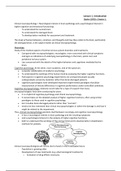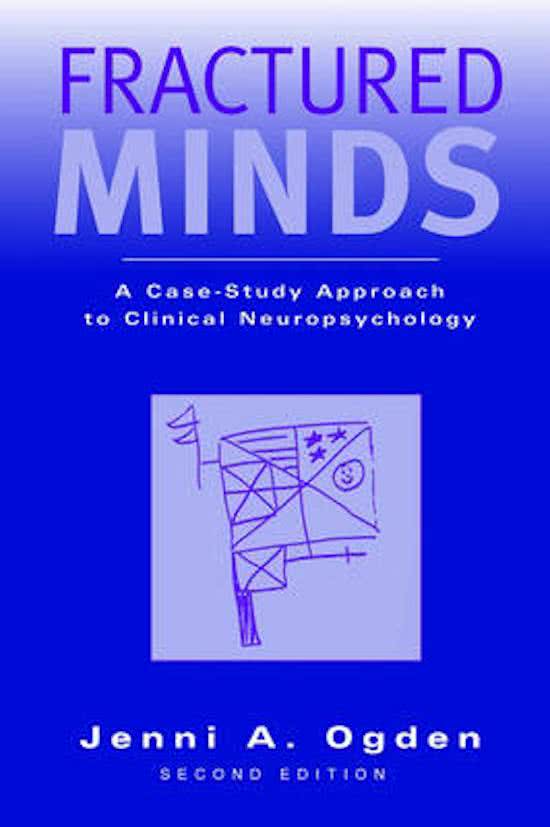Lecture 1. Introduction
Ogden (2005): Chapter 1.
Clinical neuropsychology = Neurological interest in brain pathology and a psychological interest in
higher cognitive and emotional functioning
- To understand the normal brain
- To understand the damaged brain
- To develop better methods for assessment and treatment
The study of human behaviors, emotions, and thoughts and how they relate to the brain, particularly
the damaged brain, is the subject matter of clinical neuropsychology.
Neurology:
Study of the medical aspects of central nervous system disorders and treatments.
• Compared with neuropsychologists, neurologists: more concerned with clinical symptoms
and signs as indications of underlying neuropathology in the brain, spinal cord, and
peripheral nervous system.
• Less concerned with the details of the higher behaviors and cognitions mediated by the
brain.
Cognitive psychology: At the other, more academic, end of the spectrum.
• a popular subdiscipline of academic psychology.
• To understand the workings of the human mind by analyzing the higher cognitive functions.
• Participants in cognitive psychology experiments are unimpaired people (usually
undergraduate university students) rather than brain-damaged patients.
• cognitive psychologists have developed important experimental paradigms that allow
measurement of minute differences in cognitive performance under controlled conditions.
Cognitive neuropsychology: relatively recent label for a type of research that many
neuropsychologists have been conducting for years.
• It is a hybrid of cognitive psychology and clinical neuropsychology.
• It concentrates on the detailed analysis of higher cognitive functions, often using similar
paradigms to those used in cognitive psychology
• but it studies brain-damaged patients rather than “normals”.
• tend to be less interested than clinical neuropsychologists in where the damage is and how it
might be related to the impairment.
Thus, clinical neuropsychology positions itself between neurology and cognitive neuropsychology.
• It has a neurological interest in brain pathology and the resulting symptoms
• and a psychological interest in the analysis of higher cognitive functions,
• both to understand the workings of the normal mind and to develop better rehabilitation
methods for patients.
Clinical neuropsychologists will not be short of work in the foreseeable future
- Population is growing older
- Development of new treatments (e.g. pharmacological treatments)
o Evaluation of drug effects necessary
,Typical caseload of clinical neuropsychologist
Children, adolescents, adults, elderly people
Individuals with traumatic brain injury (TBI)
Individuals with epilepsy
Individuals with intracranial mass lesions (e.g. brain tumors)
Individuals with cerebrovascular accidents (CVA; e.g. stroke and aneurysm ruptures)
Individuals with mental diseases (e.g. depression, schizophrenia)
Individuals with neurodegenerative disorders / Dementias (e.g. Alzheimer’s disease,
Parkinson‘s disease, Huntington‘s disease, Pick‘s disease)
Individuals with infectious and inflammatory brain disorders (e.g. AIDS)
Individuals with developmental disorders (e.g. attention deficit hyperactivity disorder
(ADHD), autism, Tourette’s syndrome, learning disabilities)
Individuals with substance use disorders (e.g. alcoholism)
Individuals following toxic or hazardous exposures (e.g. radioactive radiations)
An important lesson: Brain lesion is N-O-T an experimental manipulation
Brain structures:
The left figure is a lateral view of the left hemisphere, the right figure a medial view of the right hemisphere of
the human brain.
, - The large frontal lobes form the anterior part of the brain
- and the parietal, temporal, and occipital lobes make up the portion posterior to the central
sulcus.
o The parietal lobe is involved in functions involving tactile sensations, position sense,
and spatial relations.
o The temporal lobes are concerned primarily with auditory and olfactory abilities, but
they are involved in integrating visual perceptions with other sensory information. They
also mediate some memory functions, especially those involved in new learning.
o The occipital lobes are the visual lobes, and they mediate sight, visual perception, and
visual knowledge.
Lecture 2. & 3. Assessment
Ogden (2005): Chapter 2.
Assessment objectives
Basic aim of neuropsychological assessment:
- Reliable and valid “picture” of the relationships between the brain and behaviour.
- Identification of cognitive, emotional, motor and behavioural consequences of brain
dysfunctions
Central focus: Assessment of cognitive dysfunctions
Reasons for neuropsychological assessment:
I. Is there evidence of organic brain dysfunction?
- Diagnosis of brain pathology not always possible by neuroimaging, neurophysiological
assessment, lab, or physical markers
- Cognitive impairment sometimes the only indicator of pathology
o Mild Cognitive Impairment (MCI)
o Dementia
o Developmental disorders
II. What is the nature and extent of cognitive impairment?
Example:
- Is there a memory deficit?
- What aspects of memory are affected?
o (e.g. short-term vs. long-term memory, memory for verbal vs. figural information, recall
from memory vs. recognition)
- How severe are the disturbances?
o (e.g. mild, moderate, or severe)
III. What are the practical consequences of cognitive impairment?
- Activities of daily living (e.g. dressing)
- Driving capacity
- Social functioning (social skills, social role, responsibilities)
- Work / Education
- Leisure
IV. In what way is an individual's mood and behaviour affected by brain dysfunction?
- Identification of mood disorders is meaningful, since they
o need treatment






